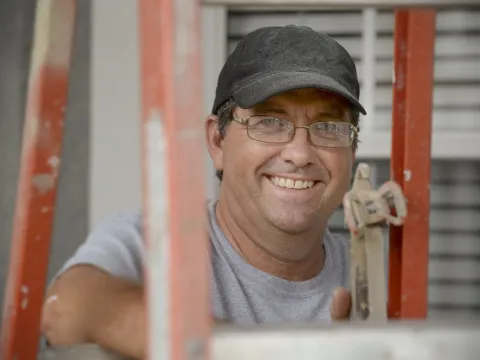- AdventHealth

Advancing medicine by using the most innovative surgical procedures is at the heart of our surgical programs at AdventHealth. In fact, some of the cutting-edge techniques we use — and develop — involve no cutting at all.
While not every surgical case is eligible for minimally invasive surgery, many surgeries once performed "the old-fashioned way" with open incisions requiring lengthy recovery time and considerable pain can now be done using minimally invasive robotic and laparoscopic procedures. Both have benefits of smaller incisions and result in lower side effects, reduced healing time, less scarring and quicker returns to normal activities.
For Routine and Complex Cases
During a laparoscopic or robotic surgery, a surgeon inserts a thin scope with a tiny camera through a few small incisions in the abdomen. The surgery can be completed with the use of instruments that allow the surgeon to manipulate organs that would otherwise require large incisions. Because the incisions are smaller than in open surgery, patients often have shorter recovery times, shorter hospital stays, faster returns to work, less pain and reduced risk of infections.
Robotic surgery has revolutionized complex surgery for many procedures including prostate, ovarian, uterine, vulvar, stomach, pancreas, liver and colon surgeries. Using the robot allows surgeons better visualization and precision. The robotic instruments are driven by the surgeon who is present in the operating room during the procedure.
Over the last several decades, studies have shown that minimally invasive techniques are safe in patients with hernias that require surgery. According to board-certified general surgeon, Juan Omaña, MD, “The old paradigm that hernias and other surgical procedures require big incisions is being challenged constantly by the utilization of minimally invasive approaches that facilitate access to cavities through smaller incisions that expedite recovery while maintaining excellence of care.”
Dr. Omaña continues, “These approaches allow patients to return to the baseline level of functionality and activity faster than procedures done through larger incisions.”
Minimally invasive and laparoscopic techniques make it possible to address the well-being of the whole patient. It's not enough to perform a procedure– a patient's comfortable recovery and return to health is an essential part of the surgical plan. AdventHealth's esteemed surgical experts blend world-class surgical technology with leading-edge care and award-winning hospitals.
About Dr. Omaña
Juan Omaña, MD, is a board-certified general surgeon with advanced training in minimally invasive surgical techniques and clinical research. Dr. Omaña specializes in procedures to treat acid reflux and other gastrointestinal conditions, hernias and endocrine disorders. Dr. Omaña was chosen as one of Orlando Magazine's Best Doctors since 2014. He was also accepted as an American College of Surgeons Fellow and has taken several leadership positions within the medical staff where he has had the opportunity to lead, interact and connect with other physicians. He is an expert in laparoscopic and minimally invasive procedures. Most of the procedures that he performs are with minimal scars and quick recovery time. Dr. Omaña is fluent in Spanish and English, believing in providing whole-person care that attends to well-being in body, mind and spirit.
Request an appointment.



